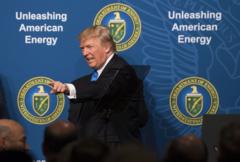As President Trump promotes fossil fuel extraction in the U.S., countries like Indonesia and Argentina reflect on their energy policies, questioning compliance with international climate agreements. The slowdown in clean energy investments mirrors a disturbing trend as major oil companies prioritize fossil fuels over renewables despite a historical commitment to the climate agenda.
Trump's Fossil Fuel Agenda Influences Global Energy Policies

Trump's Fossil Fuel Agenda Influences Global Energy Policies
The far-reaching impacts of President Trump's "drill, baby, drill" approach to fossil fuels are reshaping energy strategies in various nations, raising concerns about the global climate agenda.
President Donald Trump’s “drill, baby, drill” mantra for U.S. energy policy is having significant ripple effects beyond American borders, leading countries to reconsider their commitments to climate agreements. Following the United Nations climate summit in the United Arab Emirates in 2023, which called for a transition away from fossil fuels, concerns have emerged about a loss of momentum towards global climate action.
One immediate consequence is a growing reluctance among nations like Indonesia to adhere strictly to fossil fuel restrictions. “If the United States does not want to comply with the international agreement, why should a country like Indonesia comply with it?” asked Hashim Djojohadikusumo, Indonesia’s special envoy for climate change and energy, indicating a perceived injustice in expectations placed on developing nations.
In South Africa, initiatives aimed at transitioning from coal face potential delays as fossil fuel extraction sees a resurgence in favor, largely attributed to pressures from U.S. policy. Experts like Wikus Kruger from the University of Cape Town voice concerns that the global shift towards clean energy could stall further due to Trump’s policies influencing global markets.
Meanwhile, Argentina’s government, under President Milei, seems poised to withdraw from the Paris Agreement, aligning itself with what many see as a more fossil fuel-friendly U.S. narrative. Enrique Viale of the Argentine Association of Environmental Lawyers stated, “We now expect our oil and gas production to go up,” reflecting a broader trend where developing nations cite U.S. actions as justification for increasing their own fossil fuel output.
Major energy corporations are also shifting focus — for instance, Equinor plans to halve its investment in renewable energy while boosting production of oil and gas. This reflects a significant change in strategy amidst a backdrop of slowing growth in global clean energy investments.
In the international energy market, the U.S. is set to play a pivotal role in supplying oil and gas globally, exemplified by agreements with countries like India and South Korea to increase imports of American fossil fuels. Energy experts caution that this may impede progress toward a more sustainable energy future, as emphasized by Lorne Stockman from Oil Change International, “If the U.S. seeks to either flood markets with cheap fossil fuels or bully countries into buying more, the global energy transition might slow.”
Despite the world surpassing $2 trillion in clean energy investments last year, the growth rate has notably decelerated. Scientists emphasize the need for rapid emission reductions — around 45% by 2030 — to maintain a global warming limit of 1.5 degrees Celsius, calling attention to the pressing need for a coherent and united global response to the climate crisis.
In summary, Trump’s fossil fuel-centric policy not only reshapes America’s energy landscape but also ignites a questioning of climate commitments globally, leading many nations to consider whether they too should pivot towards increased fossil fuel production amid an uncertain climate future.





















